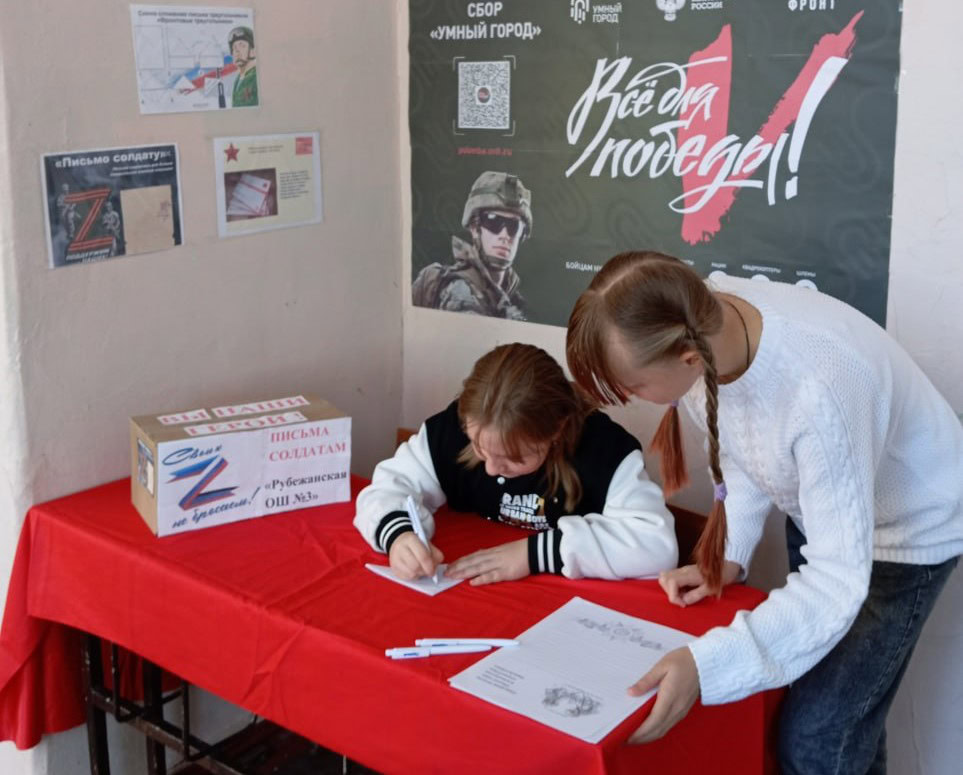

“They are Bringing up Janissaries”: Re-educating Ukrainian Schoolchildren under Occupation into Russians
A short and edited version of this text was published by Detektor, a media outlet from the Balkan Investigative Reporters Network. With the consent of the Detektor editorial team, the Occupied is publishing the full text.
It was an ordinary evening on February 23, 2022, when Sophia*, 13, went to sleep in a village in the south of Ukraine. The next morning, she woke up in what was soon proclaimed a “new” or “historical” region of Russia. There were Russian armoured vehicles in her village.
Over the night, president Vladimir Putin of Russia proclaimed a “special military operation” in Ukraine, meaning, a full-scale war. Russian troops invaded from the north, south and east encircling and seizing strategic Ukrainian cities and cutting the roads, and Russian artillery bombed Ukrainian military bases and airports.
Hundreds of thousands of civilians stormed railway and gas stations and overflowed highways in panic trying to escape the invasion. Numerous others, like Sophia and her family, found themselves trapped.
“It was very scary,” Sophia recalled. “One morning, you wake up and see tanks driving down your street. There is no electricity, and no communication because they cut off everything Ukrainian. There are no groceries – grocery shelves are empty, people are nearly fighting for food.”
That day, she did not go to school. She did not go the following days either. Not a single person from her school staff agreed to collaborate with the invaders. After all, Sophia and her classmates had to restart their studies in another village. There was no way for her to drop out, she said.
Initially, she couldn’t even care. “I used to come to school with the sense that I was dreaming,” she said. “I couldn’t believe it was happening – it couldn’t be. All my classmates became either ‘out of politics’ or pro-Russian. And the teachers kept telling us that the Ukrainians were shooting at us.”
New teaches arrived
“A significant number of teachers, our own, local, teachers, simply refused to go to work and refused to go and teach their children,” said a young woman from occupation administration in Melitopol, Zaporizhzhia region, to a Russian TV crew.
Among those who stayed, some were real Russian supporters, the others just could not or would not leave and needed money for living. Some teachers and principals were violently forced to go back to work, said Oleh Okhredko, an analyst of the Center for Civic Education Almenda which specialises in issues of education of Ukrainian children under occupation. People were detained, tortured, intimidated, and subjected to mock executions; one school principal who refused to collaborate was deported to Georgia at the end. “He was told that because he did not go to school many teachers refused to go either,” Okhredko said.
The Russian TV crew, from the Republic of Dagestan in the Caucasus, came to Melitopol to report about replacements for those who did not come back. Over a dozen teachers from Dagestan came to the occupied Ukrainian regions to teach Russian history, geography, language, and literature, the news story said.
In interviews, they lamented the low-level and distorted Ukrainian students’ knowledge of these subjects while the Ukrainian public, much of it knowing Russian as their mother tongue, mocked the heavy accent of the newcomers.
One of them, Zaira Pakhrudinova, came to Melitopol to teach Russian in September 2022 and soon became a celebrity in her village and district in Dagestan. She initiated communication between her former students in Dagestan and today’s in Melitopol, invited war veterans and current fighters from her republic to the school to meet the Ukrainian children, joined an initiative of making trench candles for the Russian fighters in Ukraine. She got several “public” awards and became a frequent figure in Dagestan media reports.
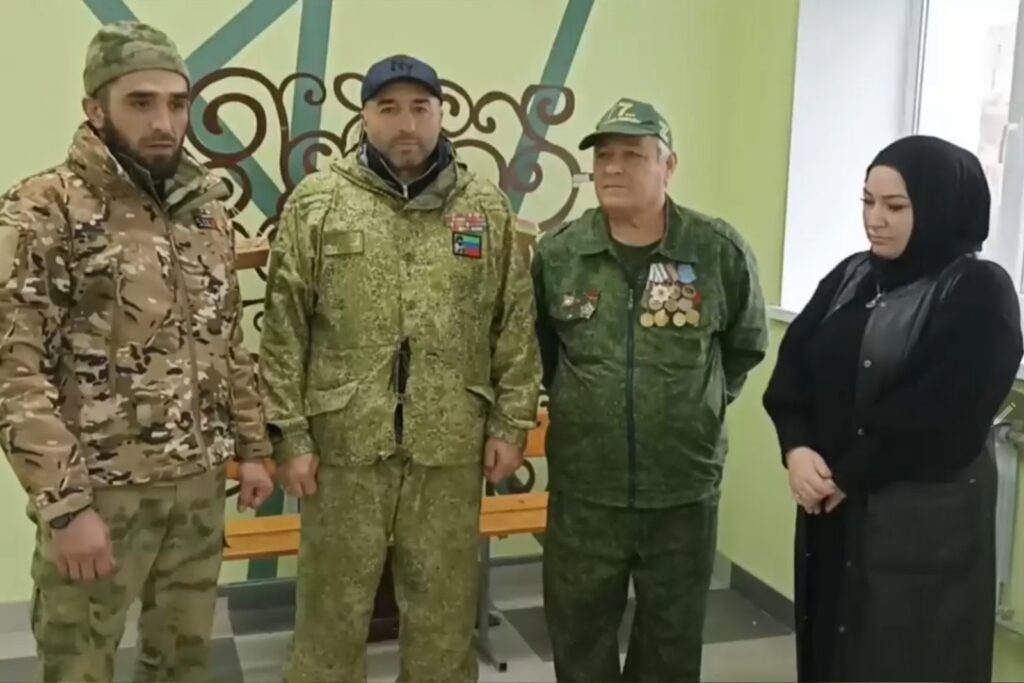
Zaira Pakhrudinova with her fellow countrymen in Melitopol. Screenshot of a video from the Gumbet district in Dagestan Telegram channel
She left her three children at home in her village but insisted that she went to the occupied part of Ukraine “voluntarily” to pay her tribute to Russians and Ukrainians who went once upon a time to Dagestan to teach her parents and grandparents Russian. The Russian Empire conquered Dagestan after over 40 years of war in the middle of the 19th century – the events well described in the very Russian literature Pakhrudinova is teaching. Today, it is the poorest among the Russian and Russian-controlled regions, including all the war-ravaged Ukrainian territories which Russia annexed in September 2022.
Russia offers non-local teachers an impressive signing bonus and wage premiums for coming for work to Ukraine. Still, there is a significant lack of staff at schools. Cases when one local teacher teaches several subjects, including those he or she has never known, are common even as numerous families left and the number of schools was drastically reduced.
As for Sophia, “The school I attended also had a shortage of staff because no one wanted to work there, but later, I had a teacher who just needed to live on something. On the one hand, she deliberately did not go to work there in the first year (of the occupation), and on the other hand, she forced me to sing the Russian anthem: she threatened that if I did not sing, she would write and submit a character reference against me.”
The school principal was local, a man once fired for cruelty towards schoolchildren. “We were afraid of him,” Sophia said. “He was fierce and he smelled of alcohol. I won’t say he was staggering, but we knew he was drinking all the time and he had this smell.”
Educating new Russians
There is only a tiny piece of land connecting the south of mainland Ukraine to Crimea which Russia annexed from Ukraine in 2014. The annexation took a couple of weeks while Ukraine just started to recover from the shock of a bloody revolution in February 2014. Once there, Russian occupation administrations started to incorporate all the spheres of life in the peninsula into Russia.
In the east of Ukraine, Moscow orchestrated a pro-Russian uprising the same year and then sent security officers and troops to secure the takeover it never recognised. For eight years, from 2014 to 2022, pro-Russian locals were left in political and legal limbo, identifying themselves with neither Ukrainians nor Russians, being promoted by Moscow and its local appointees as “Donbass people.”
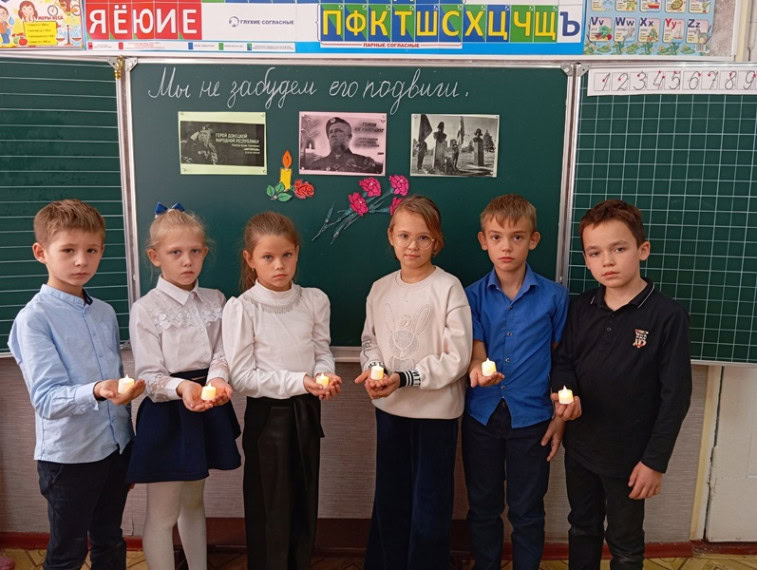
Commemorative events in honour of Arsen “Motorola” Pavlov at a school in Starobeshevo. Photo from the website of the occupation administration of the village
Russia used both Crimea and the easternmost districts of the Donetsk and Luhansk regions as its military bases and launching sites for the full-scale invasion of Ukraine in 2022. But while in the east, the eight-year-old fortified frontline held the Russian ground troops for months and has fallen gradually only due to heavy bombing, in the south, the takeover through that very tiny piece of land connecting Crimea to the rest of Ukraine was strikingly quick. The southernmost districts fell in a week, and the process of their incorporation into Russia was nearly as rapid as in Crimea.
But it wasn’t without challenges. The local resistance appeared to be more massive than elsewhere ever before. Part of the population fled immediately, many of those who remained closed their businesses and quit their jobs in an act of defiance, hundreds, even in small cities, went to the streets chanting to Russian soldiers “We are the authorities here” and “Go home,” some joined underground armed resistance.
Russia occupies about 20 percent of Ukraine. Moscow’s goal is to make all these very different “new regions” equally loyal – or equally intimidated – and Russian. More than anywhere else, it is felt in what remained of the local system of education.
A school is not just an educational institution, it is a place where the most amenable – the youngest – people are put together, stressed Myroslava Kharchenko, a lawyer from the Save Ukraine charitable fund which works on returning kidnapped and deported Ukrainian children from Russia. The efforts of the system are now concentrated on erasing the Ukrainian identity of children and their militarisation, said Oleh Okhredko.
“Already from 2022, they started to teach everything in Russian but they still taught Ukrainian,” Sophia recalled. “The next school year, they did not teach Ukrainian anymore. The history of Ukraine was replaced by the history of Russia. They burned Ukrainian books. I saw how they brought them out from the school.”
The occupation authorities introduced new rituals for schoolchildren, participation was mandatory. Every Monday, students had to raise the Russian flag in front of a school and sing the Russian national anthem. Sophia said that her classmates reported her to teachers when she did not sing. “And there are posters everywhere that Russia is our motherland. What motherland?”
There were also new extracurricular classes like Courage Lessons, Family Studies or Conversations about Important Issues, the latest also mainly about the Russian “motherland” but also about promoting the “traditional family values” like the former. Recently, Russia made legal moves to ban and make punishable what they call “child-free propaganda.”
Schoolchildren are shown films on the positive impact of “special military operation” and subsequent occupation on their regions and people there and in Russia. Also, there is a massive emphasis on the “Great Patriotic War” cult with year-round activities dedicated to certain 1941-1945 events. The Russian propaganda connects them to the fight with Ukrainian and Western “Nazis” creating the cult of heroes of the “special military operation” against Ukraine in addition.
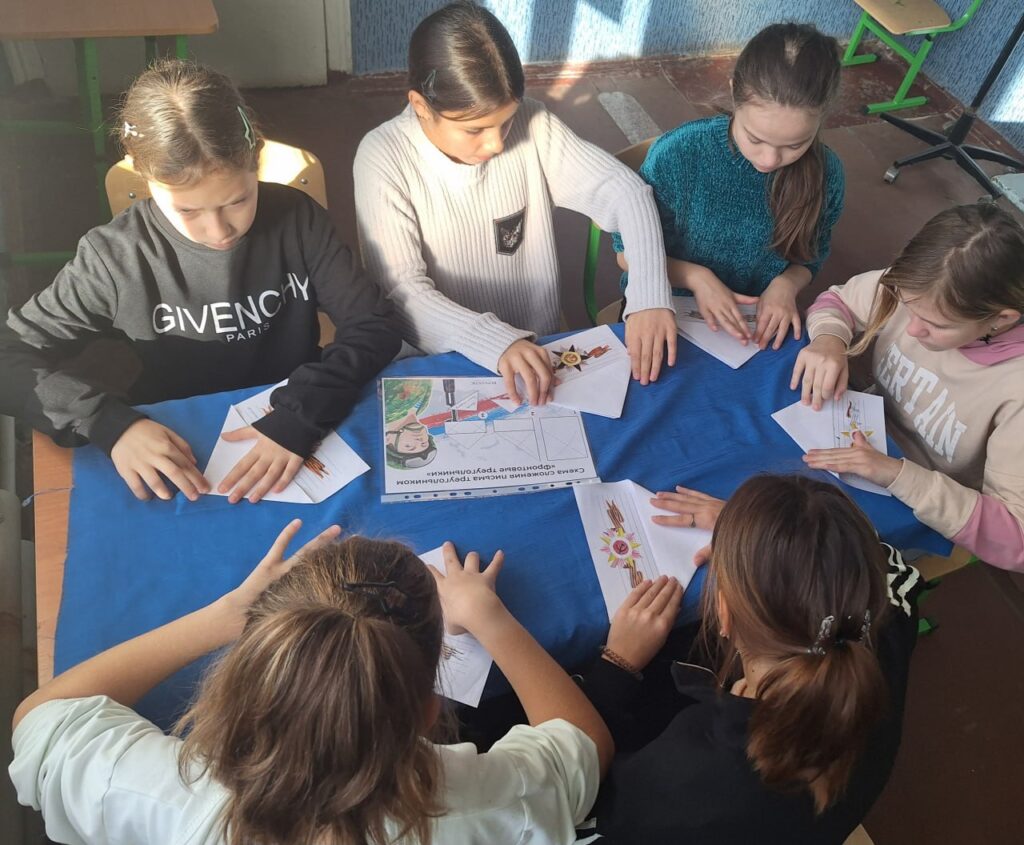
A master class for schoolchildren on folding envelopes for “field mail” in Rubizhne. Photo from the website of the occupation administration of the city
Russian army fighters are frequent guests at schools, children are encouraged or forced to create handmade gifts, write letters, or present or listen to reports on them. There are classes on how to use weapons and separate military-supervised cadet groups at schools. For older children, there is also the so-called Youth Army preparing them to serve in the actual armed forces.
“Cadets initiation” ceremony of fifth-graders in Bryanka. Video from the website of the occupation administration of the city
Okhredko emphasised that militarisation and massive “patriotic” propaganda in the school curriculum are common for all the Russian and Russian-controlled regions nowadays. On the occupied Ukrainian mainland south which used to enjoy all the Ukrainian chaotic freedoms until very recently, it just fell the heaviest.
Big hunt
It pretended to be a relaxed discussion on a local TV channel in the occupied part of Zaporizhzhia region but the host read all the questions from a piece of paper on his table. In the middle of it, he asked the guest, a head of a local occupational administration, about the situation with some parents refusing to send their children to school locally, preferring Ukrainian online education instead.
The issue was “mainly” solved in 2023, the official answered. “Yes, there are isolated cases. In the summer, we found one child who did not go to school,” he added.
School education is mandatory in Russia, as it is in Ukraine. A schoolchild now has to have Russian documents to attend school, as well as everyone has to present Russian documents to get medical treatment. Still, the pasportisation is not total, and the widespread media campaign warns those who avoid it that from 2025, they will not have any citizen rights in their hometowns and villages.
All with whom the Occupied has spoken know the cases of parents being threatened of forced separation from their children and deportation in case the children do not have Russian documents and do not attend local school. For many of those who left the occupied territories after the summer of 2023, those threats were the final argument in favour of leaving. For those who stayed, those were the final arguments to send children to local schools.
These are usually either local officials or teachers who visit families searching for school-age children, accompanied by armed soldiers. In villages, it is easier to check than in cities as everyone knows everyone. But if one is not local, a village is where one can get lost so some families either move from cities to villages or send their children to relatives there.
“If it’s a small village, everyone hears dogs barking – and they bark a lot when cars stop and armed men get out. They have time to hide everything. They have secret places where they hide USBs and laptops,” said one Ukrainian teacher who teaches online.
To avoid trouble, some children have two devices, one of them – for Ukrainian school classes – carefully hidden at home. According to Okhredko, there have been cases of a high school boy not leaving home for a year hiding from the local officials or school children avoiding any private communication with each other so as not to reveal any sensitive information. “We have families whose children had not studied at all. They had been hiding, moving from place to place,” Kharchenko from Save Ukraine said.
It’s not only about the cases of children avoiding Russian school curricula. Some are trying to attend lessons both locally and online but facing more and more restrictions. Viber, WhatsApp, Facebook, and YouTube are banned and blocked in some places or everywhere, using a VPN is strongly unwelcome; in some areas, residents have no Internet connection whatsoever. Homes are searched, and devices are checked for Ukrainian content and contacts.
Everything is being done for people losing access to any alternative information, Okhredko summarised. From the point of view of setting the right stage for brainwashing, these are the right steps, one can conclude from Sophia’s story. “Initially, I didn’t have a clear stance. But I compared Ukraine and Russia. I was also influenced by social media. I started coming across videos with Ukrainians explaining what was wrong with Russia,” she said.
Matter of trust
Of course, there are also carrots, not just sticks. Large families with children of school age can count on social benefits – but only if children have Russian documents and attend Russian school. In 2022, parents were paid for sending their children to school locally, and special monthly payments were introduced for families with school children at local schools.
“We were given free food – buns and juice. Children were often invited to recreation camps, free of charge, on excursions to Moscow and St Petersburg. They distributed coal and humanitarian aid. In a word, they were trying to appease as best they could. Many villagers bought into it: ‘They were so kind – and what did Ukraine give us?’” Sophia recalled.
There are many opportunities directly for children, especially those with leadership skills, like promotion within all-Russian youth organisations, all under Russian governmental control. They are meant to be a Russian succession pool in the occupied parts of Ukraine. “There will always be a core of active children who need self-realisation but will not have a choice of form of it, it will be only within Russian projects. This is our big problem,” Oleh Okhredko said.
There is some hope that children would sabotage the propagandistic efforts because this is what children often do, they rebel. “Every child, when approaching adolescence, separates, moves away from their parents, and has their secrets. These secrets should help a child to build their personal attitude to events, different from the attitude of their parents. I think that perhaps those children who have positive memories of Ukraine will keep these thoughts and feelings, and this will be what separates them from the influence of their parents and the propaganda that tells them how to think. But children who were young when Ukraine was in power probably do not have such memories,” said Natalia Mezina, a child psychologist at Ukrainian Child Rights Network which is engaged in bringing Ukrainian families from the occupied territories and facilitating their accommodation elsewhere in Ukraine.
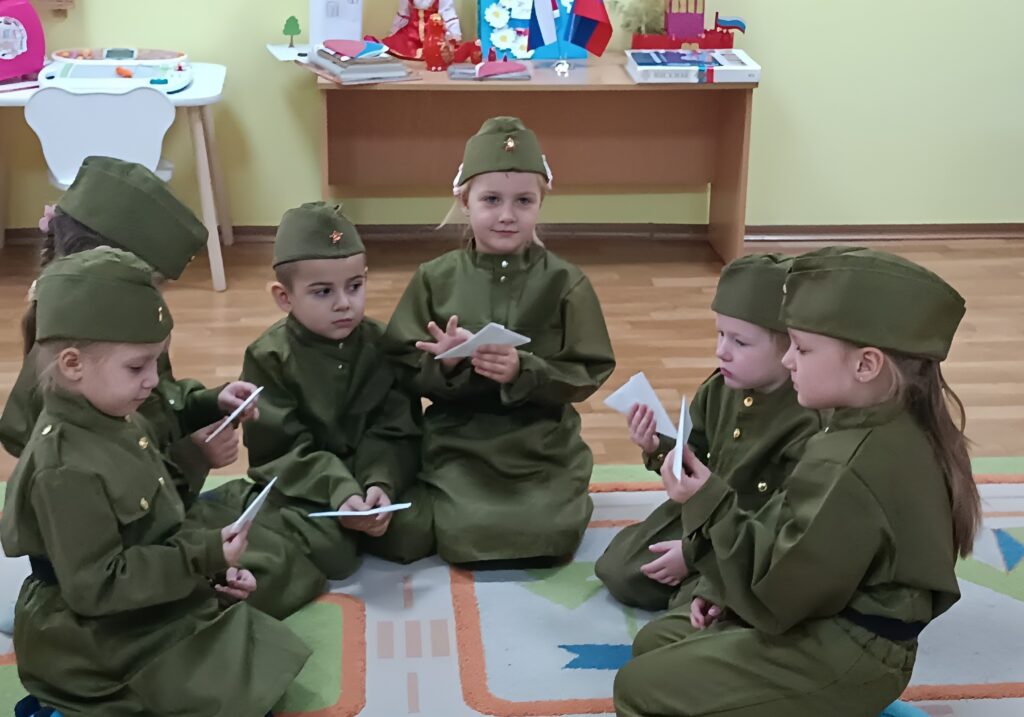
“Musical and patriotic event” in a kindergarten in Novoaidar. Photo from the website of the occupation administration of the village
The indoctrination starts already from kindergartens. And the available evidence is not very much in Ukrainian favour. Sophia recalled how her friends and their younger siblings, one after one, started to express pro-Russian views citing their parents and grandparents. Her closest circle had shrunk to one friend, and her family urged her not to express her position publicly. She said she never subscribed to either camp or an excursion in Russia.
“Children believe adults, especially teachers. And when a teacher says that Ukraine has never existed and does not exist, and that Ukrainians are not a nation but something artificially created, and if one repeats this constantly, twisting it, and if it also happens under occupation at gunpoint, sooner or later a child will believe that it is true,” said Myroslava Kharchenko.
The trust within a family is broken if parents have taught their children differently, and this lack of trust is filled with the new ideology. There have been efforts to make children, this way or another, report on their parents, to reveal those who hold anti-Russian views. Parents have to lie to their children, also for the sake of the children’s safety, eroding the mutual trust even further.
“The Russians are bringing up janissaries,” Oleh Okhredko commented.
“No state can prepare for this”
Hanna But had taught biology and German language in an agricultural lyceum in Melitopol for 23 years. When Russian troops occupied their city, she and her daughter Chrystyna, a journalist, joined the resistance. They attended demonstrations and distributed leaflets, ribbons and stickers in Ukrainian national colours in the city. Then, they had to flee.
With their house now looted and vandalised, they wander throughout Ukraine – for internally displaced Ukrainians, this is a challenge to find a place to live. Hanna and Chrystyna moved three times in two years.
Now, they live in a village where Hanna’s day starts at 5 am with making camouflage nets – something in increased demand these days as tree leaves do not cover military equipment anymore. There are Hanna’s former students among the Ukrainian servicemen she is helping. From 11 am and until the evening, Hanna teaches online for a displaced Melitopol college.
Specialised schools of the kind Hanna worked in before are for teaching manual labour like, in this case, car mechanics. In 2024, naturally, not a single student applied for online classes, and the Ukrainian government closed the school. It continues operating in Melitopol, though, despite only two teachers remaining from its pre-2022 staff, Hanna said.
The college where Hanna teaches now is more prestigious but she badly misses her former students. “I want to go back to my boys anyway. We were almost like a family. We were a gang.”
From year to year, there are fewer and fewer students from the occupied territories, and many drop out midway. Hanna has such students in her college but “I never force anyone to turn on the camera. I don’t know what condition the child is in. If I ask them a question and there is silence, I do not insist. If I ask them to write in a chat and they don’t – what can I do?”
“It’s scary when you see flags of not your country all around you, see armed people, hear terrible things at school that are actually about you, that Ukrainians are Nazis, and all the rest,” she added, explaining the psychological condition of some of her students.
Sophia, like many other children in the occupied parts of Ukraine, tried to study online in a Ukrainian school as well. It didn’t go well. The Ukrainian system of online school education is still adapting for cases like Sophia’s – it works mainly for those children who have fled the war and occupation but would like to continue studies with their classmates and teachers, all dispersed.
“I managed for about a couple of months. I couldn’t join Zoom lessons because they started at the same time as in my Russian school but I did my homework and sent it to teachers. But I was in a really bad psychological condition, I couldn’t study, I was giving up. I could do something once a month, but I did a lot in one go. I didn’t do everything and not when I needed to,” Sophia said.
Ukrainian NGOs and officials are developing special programs for students in the occupied part of Ukraine as well as those abroad. There are options to teach students only specifically Ukrainian subjects as well as individual lessons with Ukrainian teachers, with evening and weekend classes, Oleh Okhredko said.
But too much time has already been lost, and it is getting more and more difficult to reach families, and children in the occupied Ukrainian east and south. “Everything possible to block the Russians block. And there is a problem with content in history and geography for high school – Ukraine is taught within its state borders. From the point of view of Russia, this is an encroachment on its territorial integrity, which is prosecuted criminally,” Okhredko said. “Studying in a Ukrainian school means a physical danger to both children and their parents. No state can prepare for this.”
Families fleeing occupied territories for other regions of Ukraine or elsewhere do not inform anyone locally about their plans, do not take documents from their local schools, abandon almost everything of their possessions, and are getting separated from their loved ones who do not want or cannot leave. Still, many high school students like Sophia have fled or are going to flee to study in Ukrainian universities or abroad. Sophia is now in Kyiv for her latest school year.
Many families also come back to their occupied cities and villages unable to overcome the separation and poverty they face. “People who fled the occupied territories are often disoriented because of life under constant stress under occupation, they are apathetic, they need and count on help. Most of them are dreaming to come back and are living in these dreams. They do not have a full-on life, they do not plan anything. It is easy to convince them to come back if they have relatives there, especially if they met economic hardships here,” said Oksana Likarina, a mental health and psychosocial support specialist at the Ukrainian Child Rights Network.
Natalia Mezina, Likarina’s colleague at the Ukrainian Child Rights Network, also talked about frequent cases of anxiety and social withdrawal among Ukrainian children directly affected by the war and occupation. “Many children have been deprived of opportunities to play, sleep, speak freely, and communicate with their peers in a normal way, which is about their basic psychological needs,” Mezina said. “We may observe the effects of this war for a very, very long time, down the generations.”
*Name changed for security reasons.